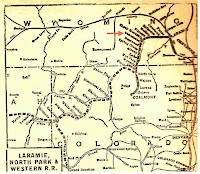In 1875, gold was discovered on the eastern flank of the Medicine Bow Mountains in southeast Wyoming. The settlement that sprang up in the valley below officially became a town the following year, and was called “Centennial” in honor of the 100th anniversary of the founding of the United States of America. Thus it seems fitting to feature Centennial in celebration of another centennial event -- my 100th blog post.
 |
| Approaching Centennial from the east. In 1875 gold was discovered on Centennial Ridge, above the town to the west. |
The first whites to settle the Centennial Valley were loggers and tie-hacks, supplying railroad ties for construction of the Union Pacific Railroad in 1868. The work camp was abandoned after construction moved west, in part due to harassment by Indians. Over the next decade, ranches were established under the Homestead Act, but it wasn’t until gold was discovered that a real community came to be. The gold rush was short-lived -- the quartz vein was rich and eagerly followed, but in less than two years it disappeared at a fault, never to be found again. Of course hopes didn't disappear, and exploration has continued off and on. It has to be here somewhere, it has to be!
 |
| Centennial in the 1920s. From Wyoming Tales and Trails; no source given. |
 |
| From Passenger Railroads of the 1930s-1940s; no source given. Click to view. |
The town hung on after the bust, populated by loggers and merchants supplying area ranchers. There were two more mini-rushes, in 1902 and 1923-24, but they turned out to be little more than rumors. Logging picked up in 1905 to supply timber to a coal mine in nearby Colorado, with a sawmill, planing mill and lumber yard added to the town. A railroad from Laramie to the coal mine was completed as far as Centennial in 1907, finally reaching Coalmont near modern-day Walden in 1911 (Laramie, Hahns Peak and Pacific Railroad). [The struggling line eventually was sold to Wyoming Colorado Railroad, which operated it as a tourist attraction, taking passengers across the Laramie Basin and up the east flank of the Medicine Bow Mountains to the crest at Fox Park. Sadly the business came to an end and the line was abandoned in the 1990s. The rail bed in the Medicine Bow Mountains is now open to hiking and biking.]
Centennial has been described as a “quaint little town” with “a history of failed dreams” but that is hardly the case. It is a small but spirited burg of ca 100 dedicated souls, with a reputation for fun and creativity. It serves as a key recreation gateway, winter and summer, and yet something ... maybe the harsh winters ... has kept commercialization under control.
The best source of information about Centennial happenings is the Centennial Branch of the Albany County Public Library. You can visit in person or online.
Above: Librarian Deb welcomes all to the Centennial Library, built in 1993 with lots of volunteer help. Whether you seek information, a charge for your iPad, internet access or simply a pleasant place to read for a bit, the staff are happy to help.
Below: In 1979 the library moved into donated space -- Pat Self’s former Goodie Shoppe -- and James Michener attended the Grand Opening (his novel, Centennial, had been published five years earlier).
In 2011, the 31st Annual Centennial Valley Art Show featured 46 artists from southern Wyoming and northern Colorado.
The Nici Self Museum “preserves, interprets, and celebrates the natural, cultural, and developmental history of the Centennial Valley and its people ...” focusing on railroads, mining, ranching, and timber harvest. It is named for Bernice “Nici” Self, a founding member of the Centennial Valley Historical Association. Nici and others persuaded the Union Pacific Railroad to donate the 1907 depot that now houses most of the museum’s collections.
The museum is open Memorial Day weekend through September but if you are lucky, as I was, a volunteer may let you in during the off-season! Jim was repairing the carriage house when I was wandering around the property in March, and kindly offered to open the depot for a tour and photos.
 |
| Skis, wood stove and a hot bath are essential if you live in Centennial ... |
 |
| ... plus an office with all the modern conveniences. |
 |
| Keep the kitchen pantry well-stocked (above and below) ... |
 |
| ... and the table nicely set. |
 |
| The old beehive burner from the local sawmill is now part of the museum. |
Some geology ...
Centennial is located at the north end of the Centennial Valley, a classic Laramide-style basin between two uplifts: Sheep Mountain to the east and the Medicine Bow Mountains to the west. Photo above modified from ArcGIS online; cross-section below by the author, 1984 (click to view).
How to get there ...
Centennial is just 30 miles west of Laramie on Highway 130, the Snowy Range Road.
 |
| From Google Maps, click to view. |
And finally ...
 |
| Words of wisdom, Nici Self Museum, Centennial, Wyoming. |










No comments:
Post a Comment